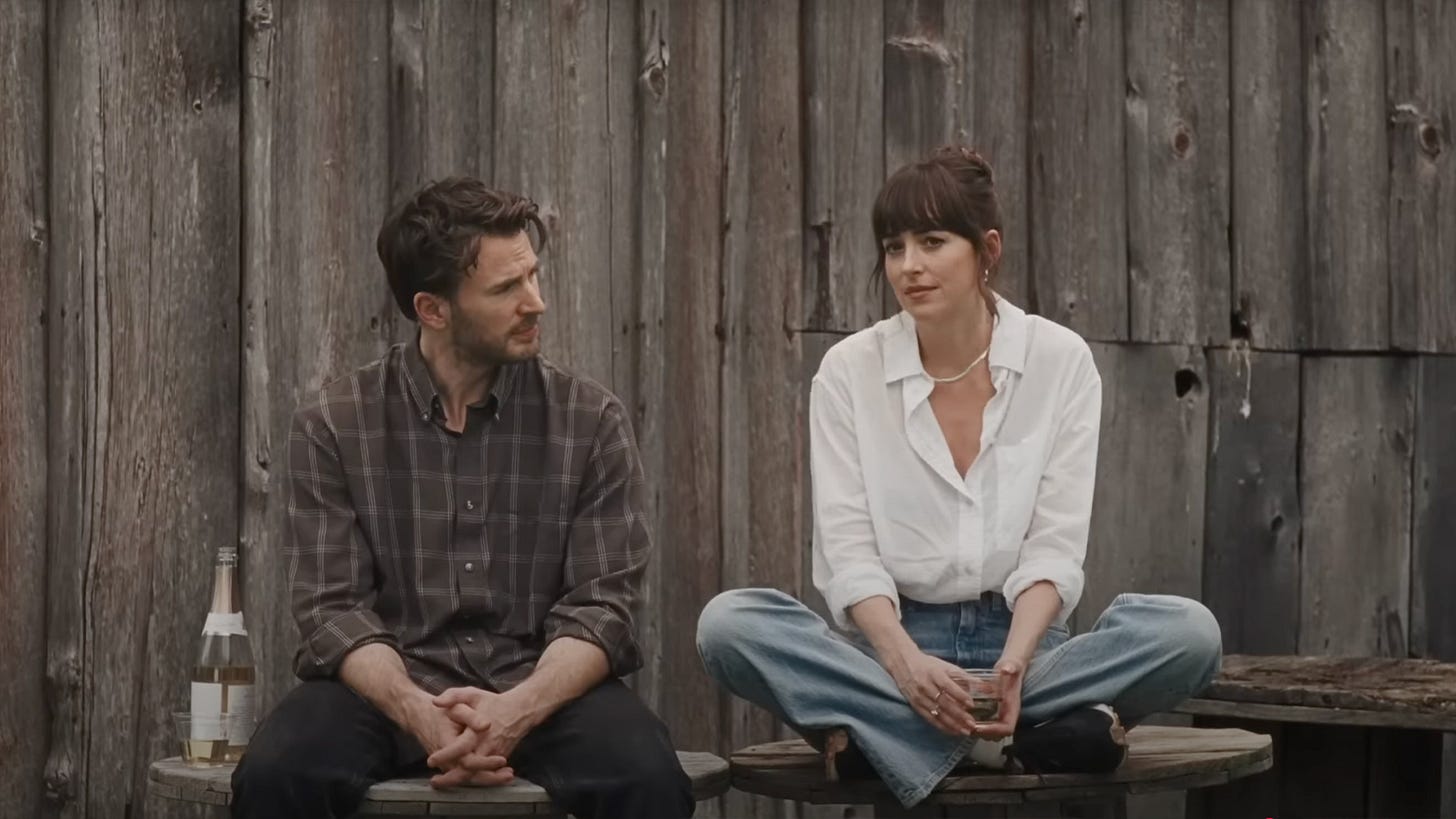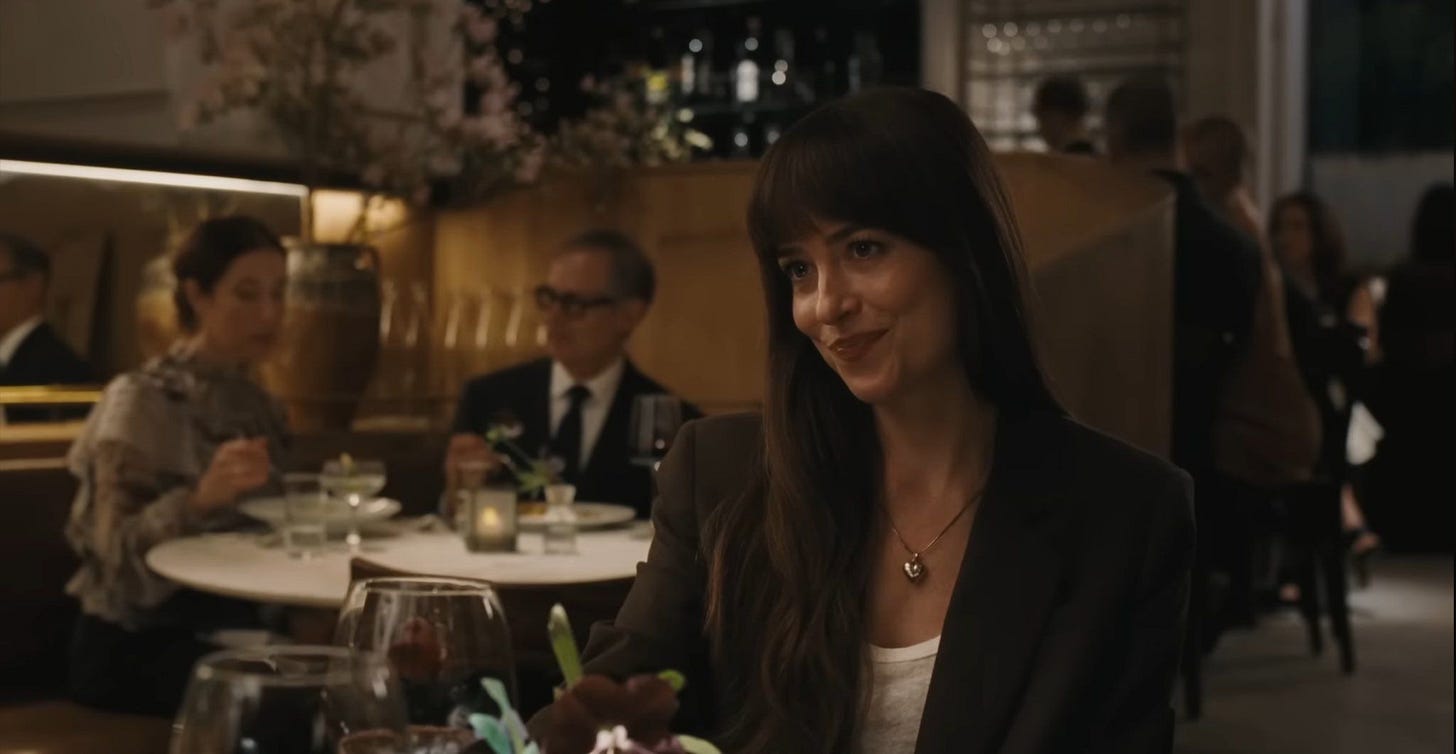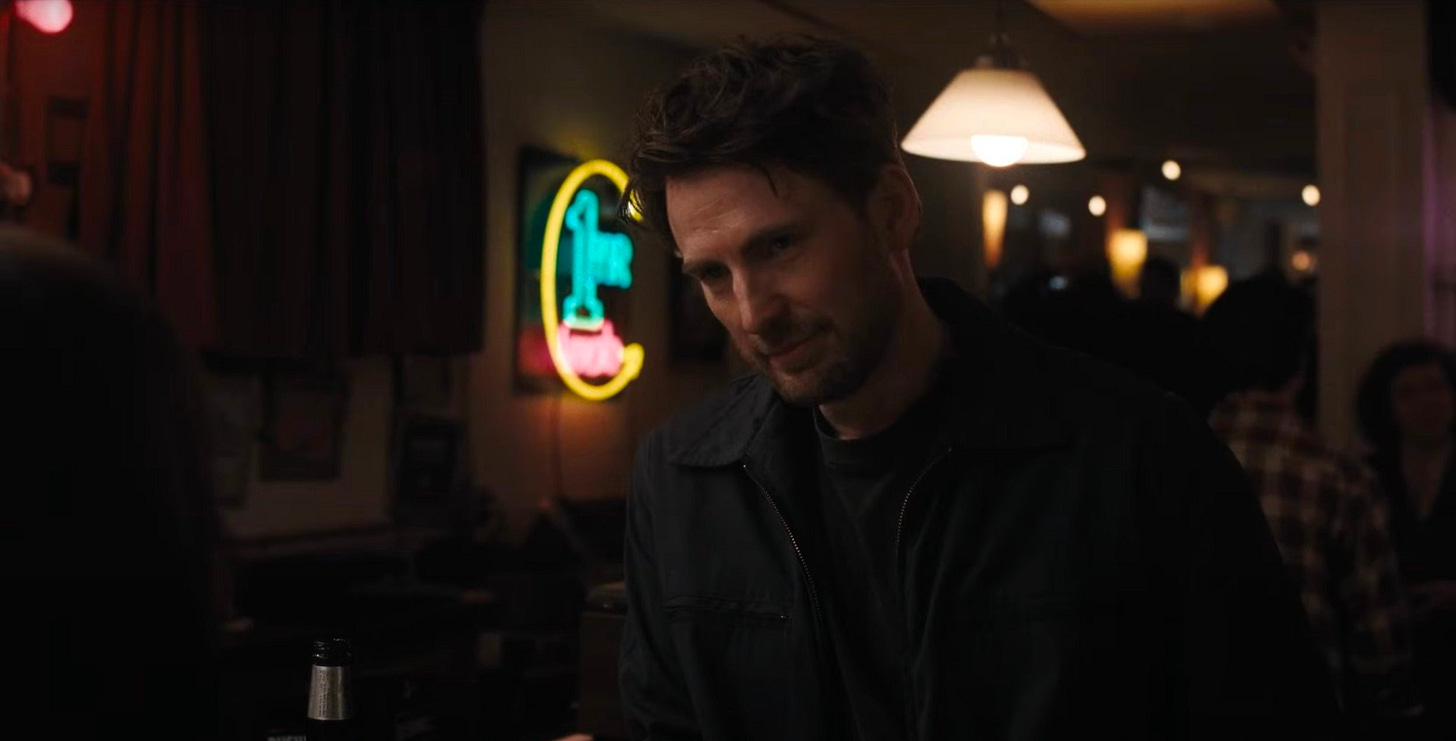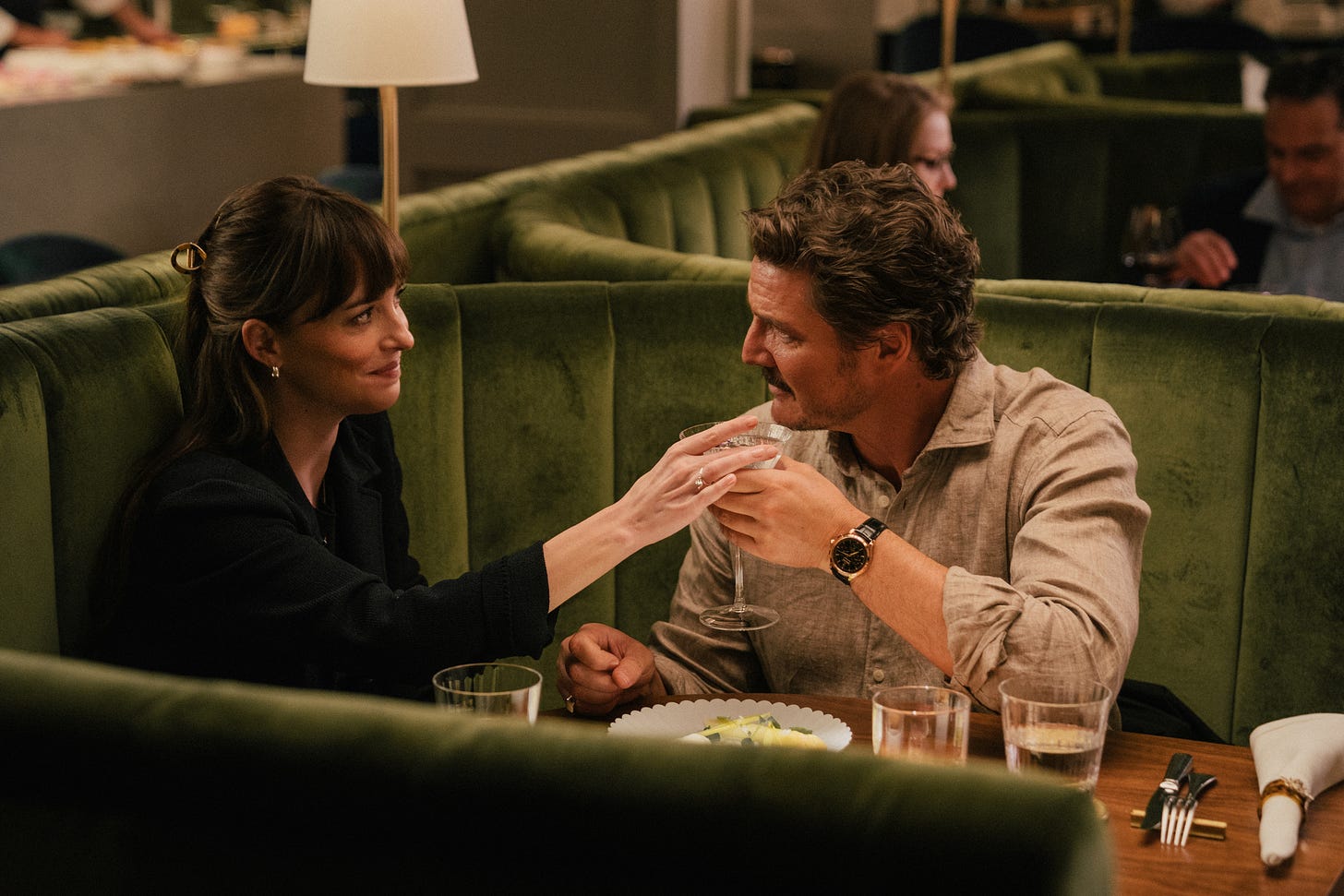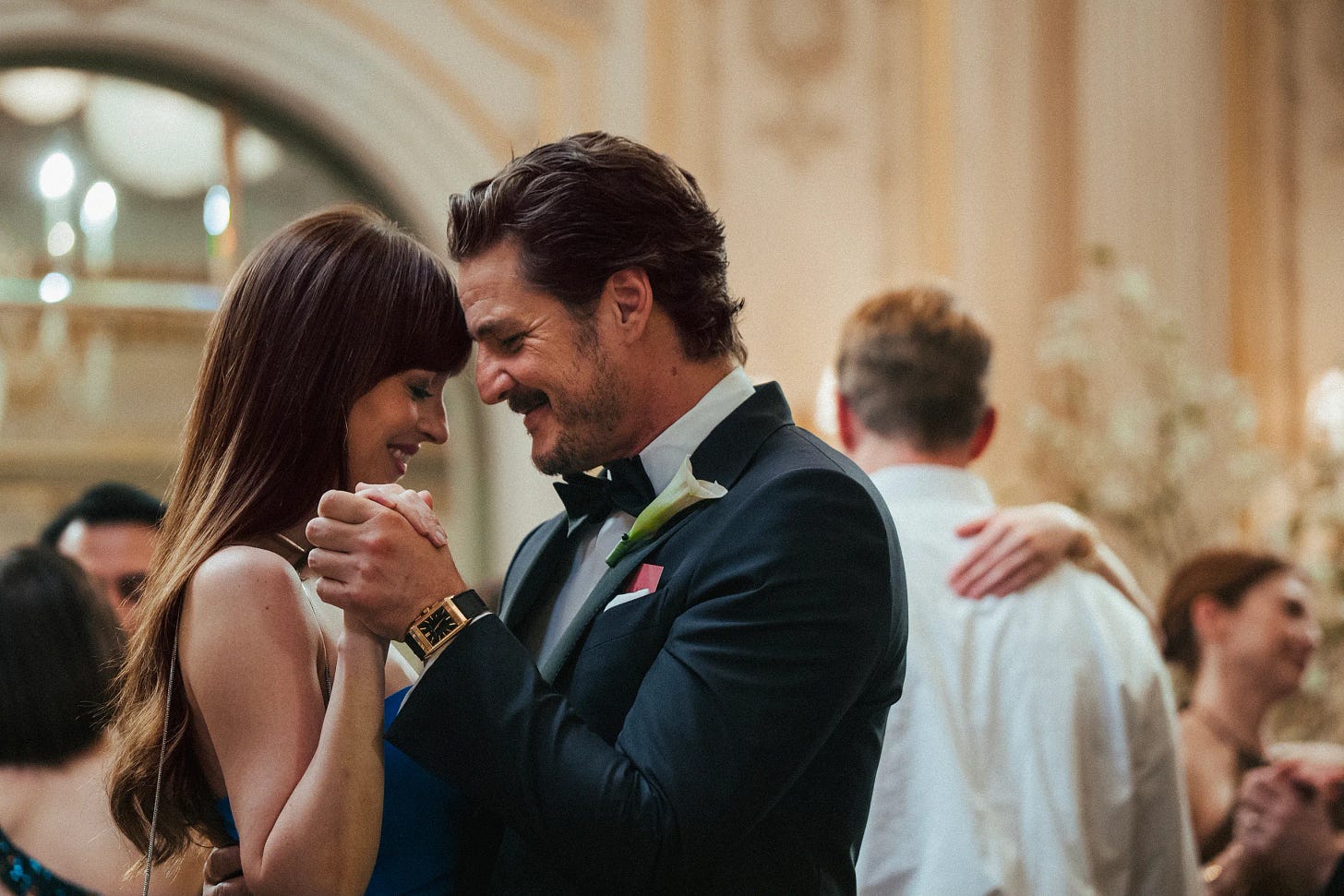In sports, it’s very hard to go back-to-back. And even harder with films. After Celine Song broke through in 2023 with her brilliant romantic drama Past Lives, expectations were sky-high for her sophomore effort. Casting Pedro Pascal, Chris Evans, and Dakota Johnson as the three leads, Song decided to go full-on Hollywood. Inspired by the late 80s to early 90s romantic comedies such as Working Girl and Broadcast News, it was clear Song was taking a pretty big risk. Romantic Comedies haven’t been at such a nadir as they are now. The only rom-coms you see make any noise are the straight-to-streaming garbage. But I love rom-coms and still believe romance is the pillar of all great art. Still, I admit that I was skeptical about Materialists, especially with the teasers fully embracing the corn of the genre. It begs the question, is Materialists another forgettable entry in a dying genre? Or does it have the legs to stand with the greats?
What it’s all about
Materialists follows Lucy (Dakota Johnson), a sharp New York City matchmaker with a stellar professional track record and a personal philosophy rooted in financial and emotional pragmatism. A former actor turned relationship expert at the elite firm Adore, Lucy stays single by choice, insisting she’ll only settle down with a wealthy partner. But when a charismatic financier (Pedro Pascal) begins to woo her just as her idealistic, financially struggling ex (Chris Evans) reappears, Lucy is pulled between the life she’s built and the love she once believed in.
Commodification of Love
In an age of instant hookups, endless scrolling, and brainless influencers, Materialists speaks to my grievances over the steep decline in romance within the culture. Nowadays, we view potential partners as long-term investments to see how much value they’ll provide over time. The era of romanticism seemingly belongs to a bygone era, as cynicism has grown into the prevailing fashion. Of course, all relationships are transactional to some extent. Even love has a transactional nature. However, in a world increasingly driven by practicality over genuine emotion, we risk losing whatever soul we have left. In exploring the commerciality of modern love, Song investigates the root of this transactionality—how or why we seek validation from the people we love. Self-validation may be the ideal, but we’re not machines. Throughout history, love, status, and external affirmations have often stood in for inner worth. While some deride those who rely on others to feel whole, Song takes a compassionate approach. In a society growing more individualistic, the truth remains: we all need love. Even the snooty, wealthy, and morally corrupt clients Dakota Johnson serves are just as lost on the inside as the world’s values shift.
The internet amplifies these woes, from “alpha males” who reduce women to physique, age, and body count, to strains of hyper-independence in modern feminism that frame vulnerability as weakness, and even to those who view relationships purely as dollars and cents. Of course, humanity is far more nuanced than what we see on reels (at least I’d like to believe so). Still, there’s no denying that many are gravitating to these extremes, drifting away from the ideals of love. Materialists asks, "Whatever happened to old-fashioned love?” and “Can it even exist anymore?”. Loving people for who they are or how they make you feel. How they value you as an individual. In a world where almost anything can be commodified, we seem to be “above” these primal intuitions. Whether it’s loving people for the sake of love, or even doing anything for the sake of it. Do you like a hobby? Well, monetize it. You love that guy? Well, is he respectable? This is a malady of a result-oriented culture that’s distinctly American, which Celine Song pinpoints with precision and accuracy.
Human Beings
Despite the fun, airy vibe the film promises in its promotions, it’s straightforward and cold about the chilly world of modern, upscale dating. We’re never inundated with poor melodrama or sappy sentimentality; instead, we’re introduced to a world where people are treated like prospects in a horse race. He has to make 500,000 dollars. Only six feet and above. She has to be skinny. Can’t be in her 30s or late 20s. Some may argue these sentiments are an extreme and an unfeeling interpretation of where we stand as a culture. But their extremity stands in contrast to what Song believes truly matters in a material world. People. I haven’t seen a film in quite a while that rounded out every character so wonderfully. Every single person, down to the bit role, is brimming with life and energy. It’s a credit to the brilliant casting by Douglas Aibel, who doesn’t compromise on even the smallest part. Aside from the ensemble, it comes down to writing truly human characters. Films so often get on their soapboxes and preach about the world, making empty gestures to some altruistic cause. Instead, Song takes a second to illuminate the world through a series of eclectic personalities. Whether it’s the men and women Lucy interviews or the bride she consoles before her big day, their shallowness, apathy, brutality, and sorrow all reveal a common hurt. Loneliness. Song paints how a series of innocent souls have been irrevocably transformed by generations of greed, wealth, and diminishing values. She could have easily just satirized and discarded the uber-wealthy to make her grander point, but she takes the time and effort to not chastise them for their present condition but empathize. Song finds the humanism of an increasingly cruel world.
Gut Punch
There’s one side character played by Zoe Winters who plays a pivotal role in Materialists, bringing all the threads together. She steals every scene as one of Lucy’s clients who is sexually assaulted by a man Lucy set her up with. A serially difficult client whose standards are too high, yet her “standing” too low. She’s the tragic figure who inspires the film’s pivot from the superficial glitz to whole-hearted tenderness. There’s a serious and valid argument that an urgent issue like sexual assault is being exploited to serve a plot device that, albeit logical, may come off as insensitive. It’s reminiscent of the date rape subplot in Broadcast News that was convenient for the plot, but, in my opinion, came off as off-putting. However, Materialists operate the tight-wire act superbly, much due to Song’s care for the human beings in her world. She cares about every bit-part so much that her plight doesn’t become some simplistic socio-political talking point or a mere plot convenience, but the gut punch the film desperately needed.
Matchmaking Madame Web
I can’t emphasize enough how well Song’s film is cast. Initially, my eyebrows raised when I heard Dakota Johnson, Pedro Pascal, and Chris Evans would all star together. It seemed odd and buzzy for a director whose sensibilities are far more indie than the cast. But they’re all brilliant. Johnson is a standout. Her monotone voice has been meme’d countless times. Unfortunately, it’s given the public the illusion she can’t perform, but that can’t be farther from the truth. Materialists is a film all about presentation. And, how Lucy treats a client versus a colleague versus a lover is all conveyed by Johnson through subtle shifts in vocal modulation and body language that complete her character’s ethos. I’m not joking when I say she should be in serious contention for Best Actress this year, but alas, the Academy rarely awards films that aren’t afraid to stir lively debate. Growing up in Hollywood royalty, she carries the hallmarks of a classic Hollywood star—able to make a million out of a simple moment, sustain silences, and command a scene.
While Johnson may have been raised in the Hollywood ways, Pascal worked for it. He is an absolute revelation in this film. Playing the heir to a generationally wealthy family in “finance”, Pascal carries himself with the old-school Hollywood charm that only the select few possess. Despite the glamour, good looks, and everything in between that make his character seem outright perfect, there’s a deep hurt beneath the surface. That the screenplay embraces these contradictions and that Pascal can convey this inner struggle with such control while never losing his movie-star presence is downright impressive. And this is what I mean by Song crafting her world with actual human beings. On paper, Pascal is the clear heavy. He’s the practical, and Evans is the passionate. He’s the figure standing in the way of “true love”. But the humanistic approach to each character and his sheer magnetism makes you question the typical hierarchy.
But Chris Evans has the toughest role. The lone advocate for pure love in a sea of superficiality. He’s not a classically alluring romantic lead, but rather the most destitute figure in Song’s world. At first, you can’t fathom what Lucy sees in this guy other than a pathetic loser without any direction. But over time, as the film changes course, so does Evans. We begin to see the sensitive, hopeful, yet plausible possibility of happiness in a world growing increasingly more soulless. Evans matches Johnson’s softness and doesn’t dominate the screen the way Pascal does, but flows freely into Lucy’s life as a soothing respite. What Song does with Evans here is an absolute delight in what may be his career performance. Going from a relatively unknown trio in Past Lives to a star-studded one here is also downright impressive. And to still bring her indie sensibilities and care to these characters while managing their star charisma, not only creates a slice of life, but a piece of cake.
An Assured Hand
Romantic comedies tend to be ignored for their craft or style. But that shouldn’t be the case for Materialists. She may not be in your face like many filmmakers, but Song directs with a quiet confidence and style that’s indistinguishably her own. As an audience member, it’s clear we’re being puppeted by someone fully aware of every frame. Her instincts are almost unfailingly sharp. She brings attention and care to scenes that other filmmakers might breeze through. Song is a classicist at heart whose style doesn’t draw unnecessary attention to itself. It’s deeply calibrated to the subject matter, tone, and characters. That same restraint extends to the cinematography: lush and cinematic, where cinematographer Shabier Kirchner captures the texture of New York from the street level to the high-rises. There’s a preference for naturalistic lighting that leans into softness and golden hues indoors, and a cooler, more clinical tone in exterior urban spaces. Yet her frames are unflinchingly picturesque, borrowing from period romances in a distinctly relatable urban setting. In addition to Kirchner’s photography, Daniel Pemberton’s score is electric as a wonderful callback to the 80s/90s rom-coms while also imbuing it with the romanticism of period pieces. It’s a certified bop that perfectly embodies Song’s vision.
Champagne Movies
Materialists make everyone angry. Those who want a glitzy, feel-good romance are disappointed by the cynical realities of modern dating. Then, those who wanted a hard-hitting romantic drama from the filmmaker behind Past Lives can’t bear the Hollywood glitz and glamour. But to me, it’s the perfect adult escapism. The exact kind of picture audiences are clamouring for but can’t appreciate when it stares them in the face. In the 1930s and 40s, Hollywood specialized in what I call the Champagne Movie. Think The Philadelphia Story, The Awful Truth, Design for Living, etc. George Cukor, in particular, thrived on escapist romantic comedies where people sat around in expensive suits and satin dresses, sipping champagne and getting into various hijinks. And, of course, falling in love, or most likely falling back into it. Materialists is the Champagne Movie of our generation and makes no qualms about it. Yet its ambitions are far higher than those Golden Age offerings, along with even some of the films Song herself cited as inspiration. It’s because Song asks the question: Why do we fall in love? But even more importantly, what makes us feel valuable? This question of value that Song posits over the history of time is one of the most poignant put to cinema in years. It reignites the dormant possibility that true love can conquer all and reminds us of our worth, no matter the dollars or inches. The kind where “a bucket of chicken” is enough. Some may not like her conclusions or are unwilling to face the harsh realities, but Song diagnoses our maladies perfectly in the summer’s most daring and brilliant effort. There’s a line in the film said in passing during a wedding scene, where a character says, “love is the last remaining religion”. If so, Celine Song may be the messiah.





